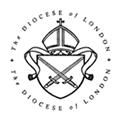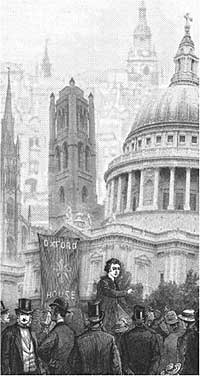How to Write a Church and Parish History: Researching Schools
The first step in relation to undertaking research about a particular school or schools is to look carefully at the building, and to note any inscriptions or foundation stones and the dates, names and events they record. When this has been followed up with listening to people who may have had experience of life in the schools and some background reading, so as to put the school you are interested in into context, you may want to see whether there is documentation about the school which you can follow up.
Next you can try to find records relating to the school.
School Records
Church Schools and National Schools
Records are likely to consist of registers of names of pupils and logbooks, which Head teachers were required to keep. There may be additional information including trust deeds, copies of inspector's reports, and correspondence and papers relating to the school buildings and life in the school, including photographs.
School records are often still in the school. If not, check whether they have been deposited with London Metropolitan Archives or the borough archive office. Failing those sources check with the parish priest or parish administrator whether any records relating to the school are in the church, perhaps in a vestry cupboard.
There may be information about the school in church records and papers. It is worth checking whether there are any long runs from the nineteenth century of church magazines that refer to the school and activities in the school. Church records and parish magazines should be deposited with London Metropolitan Archives or the local borough archive office.
Most Church schools will have been built with a grant from the National Society, and so they are likely to appear in the National Society archives.
National Society
The National Society has a rich archive of information on the history of the Church or England's involvement in education from 1811 onwards. It is held at the Church of England Record Centre in Bermondsey, south-east London.
The archive contains over 15,000 files of correspondence concerning individual schools and also holds files on closed schools, and on ‘Board' schools that were originally founded as Church schools. The files mostly contain correspondence and papers about applications for grants. Supporting papers for these applications may include school annual reports, plans, illustrated letterheads showing the school buildings, and information on the foundation of the school. Grant application forms often contain details about the building and construction of a school, and information on the local population.
Grants for funds to build a school were conditional on the officials of the National Society seeing the school's trust deed. Files therefore contain information on these documents, or sometimes a full copy. Trust deeds contain information about a school's foundation dates, and the names of the trustees.
Some Church schools in the Dioceses of London and Southwark have deposited their records at the Centre. A list can be viewed at the Centre.
The archive includes an index of school teachers, compiled from sources within the archives and library, for the period 1812-1855, and gives brief educational details of individuals trained by the Society.
For following up information about clergy who were trustees or if a schoolmaster was clergyman, they are likely to be listed in Crockford's Clerical Directory, available at the Record Centre.
The history of the Society as a corporate body, and its policies, can be researched in the minute books of its major committees, and in the complete set of its annual reports, both covering the period from 1811 to the present day.
The Record Centre holds an extensive collection of the Society's books and publications, fully indexed, which, of course provided the text books for Church schools.
Not all churches could afford to build school buildings. This appeal for funds for the Christ Church district of St George in the East describes how an incumbent obtained permission to use three railway arches as schools for six hundred boys, girls and infants. (Image courtesy of the Trustees of Lambeth Palace Library).
Bishops' Papers
Every three year bishops conducted a visitation of the diocese, and sent a questionnaire to every incumbent to complete. These very often include a question or questions about Church schools. See here for a description of these.
British Schools
Material about British Schools may have been deposited with archives of a nonconformist church either in the London Metropolitan Archives or the relevant borough archives.
The British and Foreign Schools Society
The archives of the British & Foreign School Society (BFSS) is the most important resource for information about British Schools which were established in connection with Nonconformist churches The archive includes minute books from 1808 - 1813 of the Trustees of the Royal Lancasterian Institution, and subsequently of the British and Foreign School Society from 1814. These contain reference to financial matters, including difficulties with Joseph Lancaster, the management of the Lancasterian Institution, the establishment and progress of British Schools, and teachers training with or working for Lancaster, and documents relating to the early activities of the Society, including financial papers and papers on the Lancasterian Institution and the BFSS prior to 1833.
They also include correspondence regarding individual British schools, reports and school inspection returns from the 19th century, and printed Annual Reports of the BFSS from 1814.
The BFSS Archives is in Brunel University Archives, Brunel University, Kingston Lane, Uxbridge, UB8 3PH
e-mail bfss.archive@brunel.ac.uk
website www.bfss.org.uk
Wesleyan Schools
Minute books of the Wesleyan Methodist Conference include information about debates about policy on providing elementary education and schools and its Education Committee set up in 1837, provides more information about policy on establishing schools and encouraging circuits to establish schools.
Minute books, registers, log books, trust deeds, and information about applications for grants to build schools may have been deposited either with the local borough archives, or with the Methodist Church Archive at John Rylands University Library in Manchester.
www.library.manchester.ac.uk/specialcollections/collections/methodist/ To contact them e-mail peter.nockles@manchester.ac.uk
Congregational Schools
Congregational Board of Education committee minute books from 1843 are deposited with the Archives of the Congregational Union of England and Wales at the Congregational Library, Dr Wiiliams Library, Gordon Square, London WC1 www.dwlib.co.uk
Material relating to local Congregational schools may be deposited in the local borough archive office, and may include minute books, registers, log books a copy of the trust deed.
Roman Catholic Schools
Records of Westminster Diocesan Education Fund, including reports in visits to schools, correspondence about sites, and about national legislation, and diocesan Strategy reports, from the late nineteenth century are held by Westminster Diocesan Archives, 16a Abingdon Road , London W8 6AF. Tel 020 7938 3580 e-mail tamaray@rcdow.org.uk
Individual schools should have their own records.
Sunday Schools
There may be references to Church of England Sunday schools in parish magazines, and in parish papers deposited in London Metropolitan Archives or borough archives.
There may also be questions about Sunday schools in bishop's visitation questionnaires amongst bishop's papers at Lambeth Palace Library.
The Church of England Record Centre's National Society archive includes the records of the Church of England Sunday School Institute
The Sunday School Union
The records of the Sunday School Union, which may include lists of Sunday schools are at National Christian Education Council. 1020 Bristol Road , Selly Oak, Birmingham B29 6LB Tel: 0121 472 4242. Email: enquiries@christianeducation.org.uk
Website: www.ncec.org.uk.
Ragged Schools
There may be material about ragged schools in the archives of the London City Mission, which established a number of ragged schools. See the London City Mission archives online. This includes annual reports from 1835 and committee minutes from 1835.
The Ragged School Union, which also established numerous ragged schools, became the Shaftesbury Society. The Shaftesbury Society Archives are held by Queen's University Ontario and include the Ragged School Union Quarterly Record 1867-1887 and the Record of the Ragged School and Mission Union 1888-1895.
London School Board
The minutes of the Board and its committees may be found at the National Archives.







